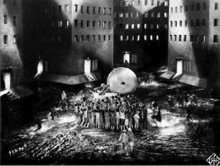 Loading... Please wait...
Loading... Please wait...New Products
Our Newsletter
Product Description
Metropolis (1927)
Director:
Fritz Lang
Writer:
Thea von Harbou (screenplay)Stars:
Brigitte Helm, Alfred Abel, Gustav Fröhlich
The biggest-budgeted movie ever produced at Germany's UFA, Fritz Lang's gargantuan Metropolis consumed resources that would have yielded upwards of 20 conventional features, more than half the studio's entire annual production budget. And if it didn't make a profit at the time -- indeed, it nearly bankrupted the studio -- the film added an indelible array of images and ideas to cinema, and has endured across the many decades since its release. Metropolis had many sources of inspiration, including a novel by the director's wife, Thea von Harbou -- who drew on numerous existing science fiction and speculative fiction sources -- and Lang's own reaction to seeing the Manhattan skyline at night for the very first time. There are some obvious debts to H.G. Wells (who felt it "the silliest of films"), but the array of ideas and images can truly be credited to Lang and von Harbou. In the somewhat distant future (some editions say the year 2000, others place it in 2026, and, still others -- including the original Paramount U.S. release -- in 3000 A.D.) the city of Metropolis, with its huge towers and vast wealth, is a playground to a ruling class living in luxury and decadence. They, and the city, are sustained by a much larger population of workers who labor as virtual slaves in the machine halls, moving from their miserable, tenement-like homes to their grim, back-breaking ten-hour shifts and back again. The hero, Freder (Gustav Froehlich) -- the son of Joh Fredersen (Alfred Abel), the master of Metropolis -- is oblivious to the plight of the workers, or any aspect of their lives, until one day when a a beautiful subterranean dweller named Maria (Brigitte Helm) visits the Eternal Gardens, where he spends his time cavorting with various ladies, with a small group of children from the workers' city far below. They are sad, hungry, and wretched looking, and he is haunted by their needy eyes -- something Freder has never seen or known among the elite of the city -- and by this strange and beautiful woman who tells all who hear her, workers' children and ruler's offspring, that they are all brothers. He follows her back down to the depths of the city and witnesses a horrible accident and explosion in the machine halls where the men toil in misery. Haunted by what he has seen, he tries to confront his father, only to find that the man he loves and respects believes that it is right for the workers to live the way they do, while he and his elite frolic in luxury. Freder decides to do something about it, but he must first learn more, and also locate Maria. With help from Josaphat (Theodor Loos), Fredersen's recently dismissed office manager, he goes below again and takes over the job of one of the workers, in order to find Maria. Meanwhile, Fredersen is concerned about the rumblings of unrest among the workers, and his son's sudden interest in their plight; he assigns "Slim" (Fritz Rasp), his investigator, to follow Freder. Meanwhile, he goes for advice to an old acquaintance, the inventor C.A. Rotwang (Rudolf Klein-Rogge). Rotwang once was a rival to Fredersen for the love of the woman Hel, who married Fredersen and died bearing his son, Freder. Rotwang still feels the loss, but he is a cunning and practical man, and is willing to help his old "friend," but not before showing off his latest creation -- a robot that he has modeled in the image of his beloved Hel, that he may have her again. Rotwang answers Fredersen's question by taking him to the catacombs below the modern city, where they see Maria preaching the gospel and counseling patience, in the hope that a "Mediator" -- who will be able to reconcile the "head" and "hands" of society (i.e. the ruling and working classes) -- will come among them. Fredersen will hear none of it, and sees the need to break the workers' resistance and destroy Maria's influence among them. He arranges with Rotwang to make his robot creation into a duplicate Maria (which requires his kidnapping her), and to send her out among the workers to incite them to violence, so that Fredersen can use force against them. But he doesn't reckon with Rotwang, who despises Fredersen and his ruling class, and has commanded the robot to obey his orders and follow a plan that will destroy the city, both above and below ground. Fredersen also doesn't reckon with his own son Freder, who not only believes in what Maria is preaching but is beginning to see himself as the "Mediator," and is right in the midst of the conflagration when the workers' uprising starts. Soon, fires and floods spread, threatening to doom the children of the workers, abandoned in their parents' frenzied attack on the machines, and the city of Metropolis faces an impending disaster of biblical proportions. Meanwhile, the now-mad Rotwang tries to reclaim his lost Hel, and Maria and her evil robot twin are both stalked by crowds of workers driven to a murderous rage.
Here is the link to the movie at the Internet Movie database; http://www.imdb.com/title/tt0017136/?ref_=nv_sr_1
Find Similar Products by Tag
Currency Converter
Choose a currency below to display product prices in the selected currency.


















